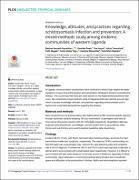Knowledge, attitudes, and practices regarding schistosomiasis infection and prevention: A mixed-methods study among endemic communities of western Uganda
Date
2022Author
Anyolitho, Maxson Kenneth
Poels, Karolien
Huyse, Tine
Tumusiime, Julius
Mugabi, Faith
Tolo, Casim Umba
Masquillier, Caroline
Nyakato, Viola Nilah
Metadata
Show full item recordAbstract
Schistosomiasis is one of the leading neglected tropical diseases, second to malaria in prevalence.
In Uganda, more than 10 million people (25.6%) are currently infected, with prevalence
in some areas as high as 90%, and more than 55% of the population is at risk. The
most at-risk populations are the fishing communities and school-aged children. Despite
the government’s prevention and control programs such as mass drug administration
(MDA) and sensitization, infections and re-infections have continued to occur, even in
areas where MDA has been implemented. Previous studies have linked this with risky
behavior. However, information from western Uganda is inadequate. We conducted a
mixed-methods study to assess community knowledge, attitudes, and practices, and to
understand their opinions and perspectives regarding the disease. The study found that,
whereas there is adequate knowledge of schistosomiasis and although there is a positive
attitude toward avoiding water contact and the use of latrines, it is difficult to do so, something
that could explain the persistent risky practices. The risky practices could also be
compounded by myths and misconceptions surrounding the disease. These findings shall
form the basis for the design and implementation of contextualized, community-based,
participatory communication tools for behavior change. Community involvement in
schistosomiasis prevention programs could lead to increased awareness about disease prevention
and could debunk existing myths and misconceptions, thereby improving behaviors,
practices, and habits, ultimately lowering infection.
Collections
- Research Articles [19]

